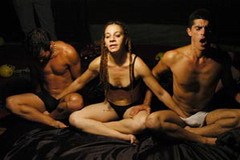Relationships and circumstances
- Submitted by: admin
- Arts and Culture
- Theater
- 11 / 30 / 2006

El Público Theater, for example, is presenting in La Casona of línea Street, its version of The Circumstances of Klara, of the German Dea Loher.
Regular pedestrians of Línea Street must have noticed the gigantic cloth announcing the staging, red background with yellow letters that covers the whole fence of the old Casona. It seems one of Carlos Díaz's jokes, one of his ironies, because such advertising arrange that seems to attract thousands, is only working for a meagre amount of thirty spectators in each show.
The reason is simple: the public should accompany actors in their journey through the rooms of the house. The events take place in the rooms, corridors, bedrooms and stairways, conveniently adorned.
In the end its very likely that one finishes tremendously tired, but theres also the satisfaction of having lived, together with the actors, a peculiar scenic exercise.
Far beyond this peculiarity (I completely ignore if the original text suggests it) the staging walks through worn paths, with more or little luck, by Carlos Díaz and its theater company. Clara's Relationships (Díaz preferred to name his version this way) has the seal of El Público. Here appears that peculiar sense of show that seems banal to some and provocative to others, but which in fact is burdened with intentions far from innocent, or improvised. It appears the game with the eroticism that dangerously surrounds explicit situations, without crossing the thin line. Here is humor, more than humor, the everyday irony, the eternal undramatization of conflicts, no matter how tragic they might look to us: Carlos Díaz seems to rub in our own faces the superficiality, our inadequate implication in the neighbor's daily issues: lets be honest, we have laughed at other people's misfortunes and we are still so calm. Here appear, lastly, the paradoxical blinks, the extraordinary power of suggestion of image, the careful choreographic design.
And this whole structure supports an overwhelming and simple history, a history of the most common thing, an inexhaustible source of history: Clara is a woman who wants to find herself , who wants to go beyond the routines that mark her life which have made of her existence the unavoidable script of a boring movie.
Clara wants to take control of her life and ends up being a social misfit. She ends up being victim of circumstances that go beyond her, victim of her relationships with people who at the same time, unaware maybe, are victims of her relationships and her circumstances. The vicious circle: how many plays, how many novels, how many neighborhood gossips on the same issue.
This is in the end, a great tragedy. Maybe without epic airs, without the features of Greek drama. Its a much more painful drama, because it can be real, disregarding distances, anyones drama.
Source: CubaSi
Comments